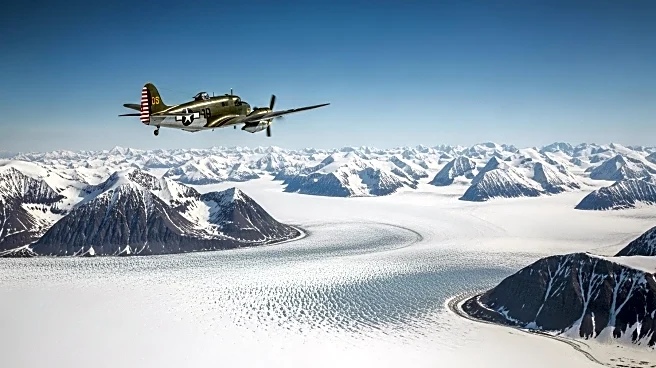What is the story about?
What's Happening?
During World War II, the United States played a crucial role in Greenland's defense following the German occupation of Denmark in April 1940. Under a defense agreement signed on April 9, 1941, the U.S. assumed responsibility for Greenland's security, marking one of its earliest overseas deployments before the attack on Pearl Harbor. American forces established bases, protected resource mines, and conducted covert operations against German weather stations along Greenland's coast. The strategic importance of Greenland was underscored by its geography and the presence of cryolite, a mineral essential for aluminum production, which was vital for aircraft manufacturing. The U.S. Coast Guard patrolled the area to prevent German submarines from accessing these resources. Additionally, the U.S. established the Greenland Patrol to defend the coastline and counter German meteorological operations, which aimed to provide weather intelligence to the Reich.
Why It's Important?
The U.S. involvement in Greenland during WWII had significant implications for the Allied war effort. By securing Greenland, the U.S. prevented Germany from establishing weather stations that could have given them a tactical advantage in the Atlantic. The protection of cryolite mines ensured the continued production of aluminum, crucial for manufacturing aircraft needed in the war. Greenland's airfields served as vital refueling stops for planes traveling from the U.S. to Europe and North Africa, facilitating the movement of troops and supplies. The strategic positioning of U.S. bases in Greenland also laid the groundwork for future military operations during the Cold War, highlighting the island's long-term geopolitical significance.
What's Next?
After WWII, Denmark regained control of Greenland, but several U.S. bases remained active, including Thule Air Base, which continues to be one of America's northernmost military installations. The historical significance of Greenland was revisited in 2019 when President Trump expressed interest in purchasing the island, citing its strategic importance. Although the proposal was rejected by Denmark, the discussion underscored ongoing debates about Greenland's geopolitical value. Future developments may involve increased investments and strategic partnerships to enhance Greenland's infrastructure and defense capabilities.
Beyond the Headlines
The U.S. military's presence in Greenland during WWII not only impacted the war but also influenced post-war geopolitical dynamics. The island's strategic location continues to be a point of interest for military and economic stakeholders. The historical events set a precedent for international negotiations regarding territorial control and resource management. Greenland's wartime experiences highlight the complex interplay between military strategy and resource security, which remains relevant in contemporary discussions about Arctic sovereignty and climate change.
















